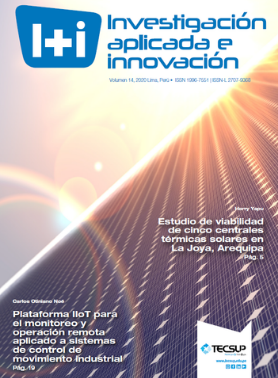Attitudes and Prejudices about Mathematics: Looking for Answers from the Students’ Eyes
DOI:
https://doi.org/10.71701/4txpz015Keywords:
Math, math literacy, mathematical attitude, prejudices about mathematics, learning difficultiesAbstract
The objective of this study is concretized in solving the fol- lowing question: what are the factors that enhance or inhibit the processes of teaching and learning mathematics? The re- search is categorized as quantitative and is aligned under the guidelines of multivariate analysis. The study population was conformed of fifth grade students from emblematic schools of Arequipa, determining a representative sample of 320 stu- dents. After obtaining informed consent, actions were devel- oped in order to collect information, where the application of an anonymous Likert-type questionnaire was the basis of the data collection; the indicators were related to beliefs and prej- udices about learning mathematics, the teacher factors, the student factors, the content factors and perception of math- ematics. The reliability of the instrument was measured with Cronbach’s Alpha coefficient, obtaining a value of 0.932. The data analysis included the use of the “Factors Analysis” tech- nique and its varimax version, it was shown that we obtained a 72.645 % variability of the data set, explained by the adopted research instrument. From the analysis, four factors emerged, which were named: 1) teacher profile, 2) student predisposi- tions, 3) overvaluation of mathematics and, 4) ignorance of the applicability of mathematics. There is a belief, politically correct and generic of the message “mathematics is difficult”; however, students need to know how mathematics is part of their dai- ly life and how mathematics should be an instrument at their service and not a purely curricular requirement. Based on the findings, it can be concluded that, in our population, the factors that inhibit the learning of mathematics are mainly related to the overvaluation of mathematics and the lack of knowledge of its applicability.
Downloads
References
Alarcón, A., y Muñoz, S. (2008). Mediciones en Salud: Algunas Consideraciones Metodológicas. Revista Médica de Chile. Recuperado de http://www.ejel.org/volume-2/vol2-issue2/v2-i2-art1-adams.pdf
Almeida, T. L., Pinto, S. S., y Piccoli, H. C. (2007). Auto-Avaliação na Fundação Universidade Federal do Rio Grande. Metodologia de Avaliação, Campinas: Sorocaba, 12(3), 515-530.
Arancibia, S. (2010). Estadística aplicada y econometría. Magíster en gestión y políticas públicas. Universidad de Chile. Santiago, Chile.
Aranda, M.; Pérez, I.; Sánchez, B. (1990). Bases psicopedagógicas de la Educación Especial. Dificultades en el aprendizaje matemático. Recuperado de http://biblioteca.esucomex.cl/RCA/Dificultades%20en%20el%20aprendizaje%20matem%C3%A1tico.pdf .
Buxton, L. (1981). Do you panic about maths? Coping with maths anxiety. Londres: Heinemann Educationbal Books.
Carretero, H., y Pérez, C. (2015). Normas para el desarrollo y revisión de estudios instrumentales. International Journal of Clinical and Health Psychology, 5(3), 521-551.
Cockcroft, W. (1985). Las matemáticas sí cuentan (Informe Cockroft). Madrid: MEC.
Dancey, C.; Reidy, J. (2006). Estatística sem matemática para psicologia. Porto Alegre: Artmed.
Danyluk, O. (1991). Alfabetização Matemática: O Cotidiano da Vida Escolar. EDUCS: Caxias do Sul.
Di Conza, J., y Quiroga, C. (2013). Las responsabilidades éticas en la publicación de artículos científicos. Revista Argentina de Microbiología. 45(4), 219-221.
Fernández, P., y Pértegas, S. (2002). Investigación cuantitativa y cualitativa. Unidad de Epidermiología Clínica y Bioestadística. La Coruña. España. Cad. Aten Primaria, 9, 76-78.
Fernández, A. (2008). Investigación y técnicas de mercado. Madrid: Editorial ESIC.
Friel, C. (2009). Notes on Factor Analysis. Criminal Justice Centre. San Houston State University.
Günther, H. (2003). Como elaborar um questionário Série: Planejamento de Pesquisa nas Ciencias Sociais, N.o 1). Brasilia, D.F.: UnB Laboratório de Psicologia Ambiental. Recuperado de https://www.ic.unicamp.br/~wainer/cursos/2s2006/epistemico/01Questionario.pdf
Hernández, R.; Fernández, C., y Baptista, P. (2003). Metodología de la Investigación. McGraw-Hill Interamericana. México. D.F. Tercera Edición.
Koepsell, D., y Ruiz, M. (2015). Ética de la investigación. Integridad científica. México D. F.: Consejo Nacional de Bioética/Secretaria de la Salud.
Kerlinger, F. (1981). Investigación del comportamiento. Técnicas y metodología. México: Nueva Editorial Interamericana.
Macnab, D., y Cummine, J. (1992). La enseñanza de las Matemáticas de 11 a 16. Un Enfoque Centrado en la Dificultad. Serie Aprendizaje. Madrid: Visor Distribuciones.
McFarlane, A.; Sakellariou, S. (2002). The role of ICT in Science Education Cambridge. Journal of Education, 32(2), 219-231.
McGuigan, F. (1998). Psicología Experimental. Enfoque Metodológico. México D. F.: Editorial Trillas.
Mejía, E. (2005). Metodología de la investigación científica. Lima: Universidad Nacional Mayor de San Marcos.
Middleton, J., y Spanias, (1999). Motivation for achievementin mathematics: findings, generalizations, and criticisms of the research. Journal for Research in Mathematics Education, 30(1), 65-88.
Minedu. (2018). El Perú en PISA 2018. Informe Nacional de Resultados. Oficina de La Medición de La Calidad de los Aprendizajes. Lima: Autor.
Miquel, S., Bigné, E., Lévy, J., Cuenca, A. y Miquel, M. (1996). El cuestionario. Escala y Técnicas de Medida.
En: Investigación de Mercados, p. 87-133. Madrid: McGrawHill.
Morris, K. (1976). El fracaso de la matemática moderna, ¿Por qué Jaimito no sabe sumar? Madrid: Siglo XXI.
Murphy, C. (2002). Literature Review in Primary Science and ICT. Belfas: Queens University. Recuperado de http://citeseerx.ist.psu.edu/viewdoc/download?doi=10.1.1.486.2978&rep=rep1&type=pdf.
Nimier, J. (1977). Mathématiques et affectivité Educational Studies in Mathematics. Revue Francaise de Pédagogie, Vol. 8, p. 241-250.
OCDE (2018). Literature Review in Science Education and the Role of ICT. Bristol: Nesta FutereLab.
Selltiz, C., Jahoda, M., Deutsch, M., y Cook, S. (1965). Métodos de Investigación en las Relaciones Sociales. Madrid: Ediciones Rialph.
Silveira, M. (2000). A interpretação da Matemática na Escola, no Dizer dos Alunos: Ressonâncias do Sentido de Dificuldade. Liberato, 1(1), 1-11.
Taylor, S., y Bogdam, R. (1984). Introducción a los Métodos Cualitativos de Investigación. Barcelona: Paidós.
Vieytes, R. (2004). Metodología de la investigación en organizaciones, mercado y sociedad. Epistemología y técnicas. Buenos Aires: Editorial de las Ciencias.
Woods, P. (1987). La escuela por dentro. La etnografía en la investigación educativa. Barcelona:
Paidós.
Zamora, S., Monroy, L., y Chávez, C. (2009). Análisis factorial: una técnica para evaluar la dimensionalidad de las pruebas. Cuaderno técnico 6. México D. F.: Centro Nacional de Evaluación para la Educación Superior.
Downloads
Published
Issue
Section
License

This work is licensed under a Creative Commons Attribution-NonCommercial 4.0 International License.


